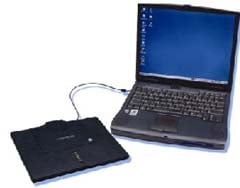Latest Gear Live Videos
FAA gives American AIrlines approval to use iPads in cockpit

Posted by Andru Edwards Categories: Apple, Handhelds, Transportation,
The Federal Aviation Administration has granted American Airlines pilots approval to use iPads during flights, without having to power them off during takeoff and landing.
"What we did was we gave them approval to use iPads as an 'electronic flight bag,'" FAA spokesman Les Dorr confirmed, noting that the official OK was given on Dec. 1.
An electronic flight bag is the paperless version of the traditional flight bag, which weighs about 38 pounds and is comprised of operating manuals, navigational charts, handbooks, checklists, logbooks, weather information, and just about anything a pilot needs to fly a plane. By contrast, the iPad-based flight bag weighs under a pound and a half and has all the necessary materials loaded in app form.
Apple iPads have been used in American's cockpits since June, but because they're considered a "Class 1" device, pilots have had to turn them off during takeoff and landing since then, absent FAA approval.
Click to continue reading FAA gives American AIrlines approval to use iPads in cockpit
Advertisement
Why do we have to turn off electronic devices during flight takeoff and landing?

Posted by Andru Edwards Categories: Editorial, Features, Handhelds, Transportation,

I must confess that I sometimes neglect to power down my iPad, iPhone, and other electronics during takeoff and landing. People near me also don't switch off their iPods either, and yet, despite flight attendants' instructions to turn off our electronics, the plane arrived at its destination safely.
Chances are, we weren't the only ones who broke the familiar rule. So just why does the Federal Aviation Agency (FAA) still require people to turn off their gadgets?
A Sunday report from the New York Times claims that even the FAA hasn't found proof that the use of electronics pose a threat during takeoff and landing. But FAA spokesperson Les Dorr told the Times that it would prefer to be overly cautious when it comes to the policy.
In 2006, the FAA commissioned the Radio Technical Commission for Aeronautics to test the effects of cell phones and other portable electronics on flights.
It concluded that there was "insufficient information to support changing the policies," Dorr said. "There was no evidence saying these devices can't interfere with a plane, and there was no evidence saying that they can."
US House bars limitating lithium-ion battery shipments on planes

Posted by Andru Edwards Categories: Accessories, Misc. Tech, Transportation,
 The U.S. House of Representatives has passed a law that would bar the Obama administration from limiting shipments of lithium-ion batteries by air.
The U.S. House of Representatives has passed a law that would bar the Obama administration from limiting shipments of lithium-ion batteries by air.
The proposed rule by the Pipeline and Hazardous Materials Safety Administration and the FAA would have eliminated exceptions for small lithium batteries, classifying them as "Class 9" hazardous cargo, and requiring a number of labeling and other safety regulations.
The House will have to reconcile its legislation with the Senate before President Obama can sign a unified joint bill, as Bloomberg noted.
There have been numerous incidents of batteries short-circuiting, and many of those have involved airplanes. (The last major battery incident involved Sony, in 2008; that recall then, however, did not cover airplanes.) The proposed rule noted that out of 21 and 44 incidents involving lithium batteries since 1991 involved passenger aircraft; of those, 16 involved carry-on luggage, and one involved checked baggage. Twenty-three incidents involved cargo aircraft, presumably in pallets of batteries being transported by air.
Click to continue reading US House bars limitating lithium-ion battery shipments on planes
Satellite Crash Causes Space Trash

Posted by Sheila Franklin Categories: Science, Transportation,

Read More  | MSNBC
| MSNBC
Spare Batteries Fly Under New Rules

Posted by Sheila Franklin Categories: Cameras, Smartphones, PC / Laptop, Portable Audio / Video, Storage, Transportation,
 There are now different rules if you intend to fly this year with spare batteries. Here are the basics from the our ever-wary government and the FAA:
There are now different rules if you intend to fly this year with spare batteries. Here are the basics from the our ever-wary government and the FAA:
- Spare batteries are the batteries you carry separately from the devices they power. When batteries are installed in a device, they are not considered spare.
- You may not pack a spare lithium battery in your checked baggage.
- You may bring spare lithium batteries with you in carry on luggage - see our spare battery tips and how-to sections to find out how to pack spare batteries safely!
- Even though we recommend you carrying your devices with you in carry on baggage as well, if you must bring in one in checked baggage, you may check it with the batteries installed.
While all this seems a bit too obvious to us, we figure that the elementary way of explaining the rules isn’t just for the casual business traveler. Check the site for more details.
Read More  | Safe Travel
| Safe Travel










